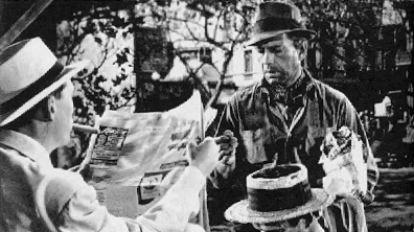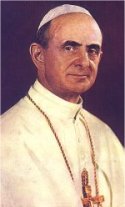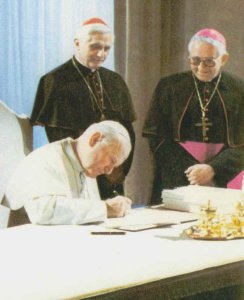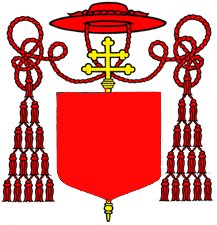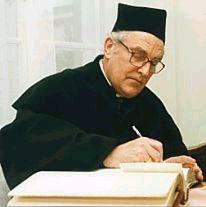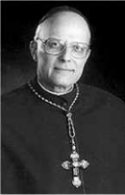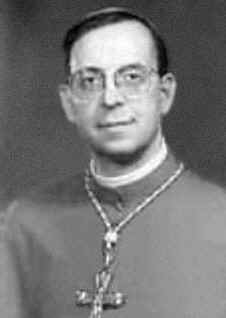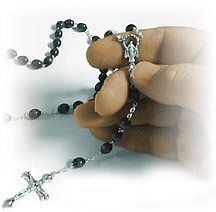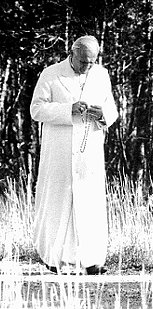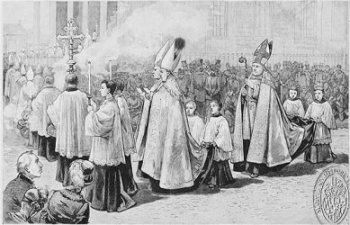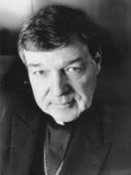|
In Light of the Law A Canon Lawyer's Blog: Archives: 2005 The following observations represent my opinions and I am solely responsible for their content. While I believe that the opinions expressed here are consistent with c. 212 § 3, I submit all to the ultimate judgment of the Catholic Church. The letter “c.” stands for “canon” of the 1983 Code of Canon Law. All translations are mine, even if they coincide at times with those of others. Dr. Edward N. Peters
19 April E-Bay and the Eucharist
Faithful Catholics react with disgust to the news that some folks are apparently attempting to use eBay to sell consecrated Hosts (obtained at papal Masses, no less). A few thoughts might help focus our discussion.
1) The sale of consecrated Hosts is a grave moral evil. Even the “private” retention of the Eucharist (say, for personal adoration in the home) is illicit and exposes consecrated Hosts to risks of profanation.
2) The purchase of consecrated Hosts is morally neutral, the moral character of the act being determined more by such factors as the purchaser’s intention (e.g., to possess it for the purpose of desecration, or to possess it to save it from desecration.)
3) EBay’s role in this event, so far, is one of “cooperation in evil” and the standard rules for assessing such cooperation should be applied before deciding what action to take, if any, in regard to eBay.
4) We have only the seller’s word that these wafers are consecrated Hosts. If someone is willing to sell consecrated Hosts, should we so easily assume that they wouldn’t lie about the wafers being consecrated in the first place?
5) There is no general moral obligation on the part of Catholics to purchase (allegedly or actually) consecrated Hosts, even to save them from potential desecration. That the purchase of such objects encourages a “market” for them should be remembered.
6) This situation has virtually nothing to do with Communion in the hand. Hosts were being taken for sacrilegious purposes long before Communion in the hand, and were being sold for same long before eBay. Of much greater relevance here would be poor Eucharistic catechesis and the increased brazenness of sinners bent on hating Our Lord in the Sacred Species. The remedies include augmented education and personal penances offered in reparation for such offenses.
The above facts do not exempt us from taking the latest variation on a sad theme seriously, but they should help us keep it in perspective. +++
Fact updates: http://www.lifesite.net/ldn/2005/apr/05042001.html
More updates (25 April) this apparently from eBay: Hello, This would be a credible response and needs to be taken on its merits. The points it makes are consistent with my suggestion that eBay finds itself in a position of cooperation with evil (whether they quite realize that themselves), and thus those standards for behavior need to be applied to determine whether eBay is acting morally or immorally.
1) May I boycott eBay? Of course, if you want to call it that, since you are not required to do business with them in the first place nor are you in the position of patronizing them frequently for necessary goods or services.
2) May I encourage others to boycott eBay? One is free to share one's opinions with others, but your conclusions should be morally sound, i.e., you should be able to defend your determination that eBay itself is acting immorally in allowing allegedly consecrated Hosts to be sold. Moreover, you need to consider that boycotts often hurt innocent people (see eBay assertions above) and that a boycott failure can result in more brazen acts by offenders in the future (if only by suggesting impotence on the part of boycotters).
While these points are being sorted out, may I suggest that well-intentioned Catholics STOP BUYING allegedly consecrated Hosts on eBay or anywhere else, and that we make better known the possibility that a world which would sell the Eucharist in the first place would not scruple to claim falsely that such-and-such a wafer is the Eucharist precisely in order to sell it. Seriously folks, this is the Internet we're talking about here: why are so many people so easily believing such claims by people who, well, would claim to do this? What possible evidence could they offer for their claim, besides their "word"? Meanwhile, what motive would they have for lying? US $ 2,000 is a nice start. +++
2 April 2005 John Paul the Lawgiver
One hundred-and-seventeen cardinals are preparing to enter the next papal conclave, and doubtless each one is thinking to himself: “There are at least one hundred and sixteen men more worthy than I am to become the next pope.” But inevitably, one of those men must be wrong. And in relatively little time, we will know who he is.
Who would want to fill the shoes of Pope John Paul II? Theologian, philosopher, apologist, political scientist, priest and bishop, and most of all, pastor to the world, John Paul II has been all of these things. Here, though, I wish to underscore just one (somewhat overlooked) aspect of this incredible man: John Paul the Lawgiver.
Pope John Paul II was not a jurist-pope in the tradition of Innocent III, Benedict XIV, or even Pius XII. And yet he wielded immense influence over modern ecclesiastical legislation. He promulgated (and often directly contributed to the very drafting of):
As the authority behind these documents alone, Pope John Paul II would have left his mark as a very influential legislator. He has provided the raw materials for canonical explorations and applications for decades, if not for centuries. But to them, one must add (oh!, where to start?):
Even this extremely short list does not do justice to his very significant use of canon law in his many teaching documents (one need only start looking at footnotes in his encyclicals and at the appendices to the Catechism of the Catholic Church to get a sense of how much John Paul II strove to alert Catholics to the legal aspects of so many of his statements). His annual addresses to the Roman Rota are of immense importance for the development of sound matrimonial jurisprudence in the Church. Even the strengthening of educational requirements for future canon lawyers occurred on his watch (Novo Codice). Perhaps now it is clearer why canonists usually refer to the pope simply as "the Legislator"!
As John Paul himself observed: "To work for the proper implementation of [canon law] is to work for the up-building of the Church herself. It is to work for the salvation of the world. It is to play an extraordinarily constructive role in continuing the redemptive mission of Christ himself." I suggest that we as Catholics owe a debt of gratitude to this pope for helping to lift canon law from the antinomian nadir it suffered in those first years of post-conciliar confusion; moreover, we as canonists have a special obligation to continue to apply the Church's laws in accord with the mind of the Church, a mind---and a mine!---that Pope John Paul II has helped tremendously to open up for Catholics in the new millennium. +++
Recent Books by Dr. Peters:
Incrementa in Progressu: A Legislative History of the 1983 Code (2005) Annulments and the Catholic Church: Straight Answers to Tough Questions (2004) The 1917 Pio-Benedictine Code of Canon Law (2001)
March 18 2005, Emergency Fast for Terri Schiavo
Terri M. Schiavo is dead. March 31, 2005.
Can we consider emergency fasting for Terri Schiavo?
"Whatever its motives and means, direct euthanasia consists
in putting an end to the lives of handicapped, sick, or dying persons. It is
morally unacceptable. Thus an act or omission which, of itself or by intention,
causes death in order to eliminate suffering constitutes a murder gravely
contrary to the dignity of the human person and to the respect due to the living
God, his creator. The error of judgment into which one can fall in good faith
does not change the nature of this murderous act, which must always be forbidden
and excluded."
Fast Options: 1) a Bread and Water*
fast until Terri is fed again; or 2) a Good Friday fast (one meal per day, two
smaller ones if necessary, and no meat) until Terri is fed again; or 3) no
snacking or eating out till Terri is fed again; or 4) some physical sacrifice
for Terri, her husband and his lawyer, all those defending Terri, and all those
attacking her. Any of these still allow us far more food and water than Terri is
getting, but if
Of related interest: A canonical aspect of the Terri Schiavo case
Answering Crocker and Crisis, 8 March 2005
H. W. Crocker III, ostensibly telling us how good children are for marriage, meanly ridiculed Natural Family Planning and, inexplicably, Crisis magazine published it (December 2004). Both apparently believe that an appropriate way to praise one good is to denigrate another. Between them, they have wronged a wholesome and important apostolate. Crocker and Crisis expect supporters of NFP to shrug it all off because, they claim, it was all intended to be funny. Well, Crocker's essay wasn't funny; it was smug. But judge for yourself:
Whatever their motives, the Crocker-Crisis brand of humor hurt a lot of good people; moreover, they have ill-served the wider community with several specious anti-NFP assertions. Prominent persons among Crisis' already-shaken circle of friends have expressed objections to the piece.
Crocker's sarcasm--to say nothing of his
T
For my own brief reply (mostly canonical) to just some of Crocker's flawed claims, read on.
Crocker committed several substantive errors in attacking NFP and the people who use it. May I suggest just three examples?
1. In his opening paragraph, Crocker completely confuses Catholic teaching on openness to children with a method for complying with that teaching. NFP needs a new slogan, says Crocker, because Catholics reject Church teaching on human procreation. That is an obvious and fundamental error in categories. NFP’s “slogans” are just fine; it’s dissident Catholics who need to change their stance.
2. Crocker says there is no apparent evidence to support claims that couples using NFP enjoy very low divorce rates. Maybe not apparent to Crocker, but there are few signs he looked. A nice place to start would have been with my article “Contraception and Divorce: Insights from American Annulment Cases” published in the Couple to Couple League’s Family Foundations, November-December 1998, on-line version (posted for a good three years now) here.
3. In the mouth of his own ethnically stereotyped creation, Crocker places words that presumably he agrees with: “The primary and fundamental purpose of marriage is not companionship, not romantic love, not moonlit strolls on the beach, or any other balderdash but the begetting and raising of children—lots of ’em, and starting soon.” Maybe Crocker should have a look at the 1983 Code of Canon Law, indeed, at its opening canon on marriage.
“The matrimonial covenant, by which a man and a woman establish between themselves a partnership of the whole of life, and which is ordered by its nature to the good of the spouses and to the procreation and education of offspring....” 1983 CIC 1055 § 1.
Phrases describing marriage as “a partnership of the whole of life” and as being ordered to both “the good of the spouses and ... to children” simply do not support the utterly unbalanced depiction of marriage (as being little more than licensed baby-making) that Crocker wishes to impose. But if Crocker can be excused for not knowing that these ideas on marriage now animate the Code of Canon Law (how many Catholics have the Code on their reading list?) he has no excuse for not knowing that these same ideas are prominent in such fundamental conciliar documents as Gaudium et spes no. 48 and Lumen gentium no. 11, to say nothing of Humanae vitae no. 8. Certainly the drafters of Canon 1055 had these texts before them, and Pope John Paul II approved this language during his line-by-line review of the Code before promulgation.
There is, to be sure, a lively debate going on about the conciliar and post-conciliar descriptions of marriage, debates animated by the fact that A) “baby-first” language was prevalent in pre-conciliar descriptions of marriage, and B) such language is completely gone from official post-conciliar articulations. But Crocker not only makes no contribution to that debate, he writes as one completely unaware of the fact that it is even going on.
Humor, like beauty, might be in the eye of the
beholder, but truth is not. Crocker’s quest for glibness at NFP’s expense does
not excuse his sacrificing accuracy about its (or any other morally licit
approach’s) tested methods, and even less does it pardon his distorted
descriptions of Christian marriage. It was a mistake for Crocker to write his
essay, and, may I add,
9 February 2005, Forcing the Pope's hand
There is a lot of silly talk—much of it self-perpetuating—about the College of Cardinals arranging for the next pope to resign upon reaching a certain age. This is complete nonsense; neither the College of Cardinals nor any other power on earth has the slightest authority to require a papal resignation (see 1983 CIC 331, resting on divine authority stretching back to the Petrine Commission recounted in Matthew 16).
Pope John Paul II has considered resignation in the past, but the desire to set an example of spending one’s last breath in service to the Church weighs heavily on him. So does, I suspect, his awareness that a papal resignation today might make more palatable the idea of another papal resignation tomorrow. Dangerous precedent, that, should the world face off against a pope who is not so widely loved. Is the Church paying a price by John Paul’s retention of office? Perhaps so, but the Church would pay a price upon his resignation, and no one grieves more at his inability to serve better the Church we love than does Pope John Paul himself.
And yet, I think another consideration may be raised here: The sufferings of old age (for those blessed to attain it) are, of course, a frightful consequence of Original Sin. But, beyond the physical hardships they endure, the vast majority of elderly face their final years without even the small consolation of being able to say that they are still being useful to others. Retirement, whether chosen or forced, leaves one very alone, makes one realize that the world is going to continue anyway, and forces the frightful question, “What have I really done with my life, now that I can apparently add nothing to it?”
If Pope John Paul II does resign, his final pontifical act should not be seen as acquiescence to the inevitable, but rather as yet another instance wherein he has shown his solidarity with the most forgotten segments of society; this last time, it would be with the long-suffering but oh-so-helpless elderly. +++
Update, February 10: If there's a lot of silliness on the pro side of the papal resignation debate, there's at least a little on the anti side as well. One high-ranking prelate, for example, is quoted as saying that it would be wonderful if Pope John Paul II outlasted Pope Pius IX's 37-year reign. Oh, really? What would be so wonderful about that?
The papacy is about service (Servus Servorum Dei), not about moving up another notch in the Guinness Book of World Records. For John Paul II to outstay Pius IX would require another ten years in office. I don't see any inconsistency between wishing, Deo volente, John Paul another 10 years of life, and harboring concerns about the papacy--and the Church--being run under the present circumstances for another decade. Ironically, most of us on the anti-forced resignation side of this debate support what political scientists would call a strong monarchial model of the papacy, even while the position we defend is leading to a de facto oligarchial reality.
The ecclesiological quandaries of an incapacitated pope are very real (the press and bloggers have not even scratched the surface yet), and we are seeing them play out before our eyes. Canon Law simply doesn't cover this situation. But the Holy Spirit does, and I'm very sure that Pope John Paul II needs no advice, pro or con, from the rest of us as to how to discern the Spirit's will in this matter.
Perhaps it is too soon for retrospectives, events might not have come to rest yet. But here goes.
When I saw Balestrieri/De Fide Press Release # 2 with its headline, SEN. JOHN KERRY “EXCOMMUNICATED,” ACCORDING TO VATICAN RESPONSE, I was stunned, not because I thought it was an exaggeration, let alone because I feared it was false, but because I believed the statement to be true. In no time at all, several major Catholic news sources repeated and expanded on the B/DF claim. It could only mean, or so I thought, a major development in a very important case.
I knew that 1983 CIC 1417 allowed the faithful at any stage of a canonical proceeding to request Rome to assume direct jurisdiction over a case, and while such transfers are not common, I figured, given the novelty, complexity, and volatility of B/DF’s heresy case against a US presidential candidate in an election year, that it had been transferred from Boston and decided against Sen. Kerry. Wow. To say the least.
But then I read Fr. Basil Cole’s actual response to B/DF. It was immediately obvious to me that such a thoughtful letter, whoever requested it and whoever might have agreed with it, was in no way, shape, or form, a “Vatican response” to anything, let alone an announcement that Kerry was excommunicated. Kerry isn’t even mentioned in the letter, and the few lines that talk about the penalty of excommunication (as opposed to discussing the crime of heresy) are carefully nuanced against particular applications and are themselves canonically debatable (as Cole himself recognizes).
Now I was beginning to feel hoodwinked. And so were lots of other people, the mass of whom have far less experience assessing canonical and ecclesiastical communications than I have, or presumably than Balestrieri has. These folks were consequently reading far more into B/DF’s characterization of Cole's letter than was warranted. Then, as B/DF’s claim to have a “Vatican response” in the Kerry case began to unravel, pundits got into debates about what “contact” means, and a lot of nasty things got said about “Rome’s backing off” and “CDF is trying to cover its tracks” and “It’s so obvious Kerry is a heretic [sic], why won’t the Vatican just say so?” and so on. But all the while, as far as Rome was concerned, it was literally a non-event. Rome had not done anything, good, bad, or indifferent. B/DF claimed that it had.
Like some other observers of B/DF’s heresy case, I have kept my reservations about its canonical persuasiveness muted. First, it’s not my case; second, my concerns about its problems might be wrong; third, unknown factors might develop to improve its chances of succeeding. But there seems little point in worrying about such things now. At this point, there only remains to salvage from the experience some object lessons, of which I think there are many. Here I will mention just one, on canonical technique.
Two impressions are given about the trip Balestrieri made to Rome after he filed his heresy case against Kerry: one version has him posing interesting academic questions about heresy to various Church officials (mostly at the Congregation for the Doctrine of the Faith), the other has him disclosing his status as an active litigant but asking more or less the same questions of the same people. Conceivably, he could have approached some Vatican officials one way and others in the other, but either way, it’s problematic. Consider:
A) If Balestrieri posed purely academic questions to important and very busy Vatican officials, who kindly referred the young scholar for some erudite guidance from equally busy professionals, he has absolutely no right later to present any communications occasioned by such requests as if they were in any way official responses to his canonical case. If that is what happened here, then no wonder Roman officials are so cool toward legitimate questions posed by outsiders: they have no idea how their responses are going to be construed by recipients. Cole’s letter could not be clearer that it was a private response. Why should Vatican officials now have to run around denying that it’s anything else, just because B/DF claims that it is?
B) If, on the other hand, Balestrieri identified himself as a litigant and asked CDF the same questions, then (notwithstanding the fact that the response he got from Cole is still utterly unofficial), Balestrieri has, at a minimum, come very close to engaging in ex parte communications with officials of the same dicastery before which appeals in a heresy case are likely to end up, i.e., the kind of communications frowned on, if not illegal, in mature legal systems, but which CDF has constantly to beware of due to the fact that it is both an administrative and a judicial dicastery. I know the disquiet an advocate feels when the other side has access to decision-makers that he and his client do not enjoy. It’s not pleasant, and whatever some people’s attitude toward using such approaches might be, I think responsible canon lawyers should strictly avoid using them, both in actuality and even in appearance.
So now, it seems to me, the canonical case against Kerry and a host of other scandal-mongering pro-abortion Catholic politicians has to be reconstructed, basically from scratch. Perhaps some of the research generated by B/DF can be used in such a case, but it is not likely to be primarily a “heresy” case next time, and it’s certainly not going to come together quickly or be tried in the media. In the meantime, the prohibitions imposed by various bishops against abortion supporters like Kerry taking the Eucharist in their territories stand, for such decrees are not dependent on the complexities of a canonical heresy trial, but rather, are firmly based on straight-forward sacramental disciplinary norms (esp. 1983 CIC 915). +++
Updates: Wow, lots of feedback on this one! Let me just respond to some of the sincere questions, or the more negative jibes. All comments are read by me, and appreciated, though I can't reply to them all. So, in no particular order:
Why do you say Fr. Cole’s letter is “private”? Cole said Balestrieri could publish it.
As I used the word, “private” does not mean “confidential” or “secret”, it means unofficial or based on personal persuasiveness instead of on legal authority. Cole gave permission to make his letter “public”, in your sense, but that does not change its “private” character. It’s a distinction canon lawyers and theologians take for granted.
Peters should not criticize Balestrieri’s case publicly.
The first I ever heard of the B/DF heresy case against Kerry was when I read about it in the news where it had been put by B/DF. I published one cautionary but generally supportive blog about it on July 1 (scroll down a bit). Not till October, after B/DF released a series of press statements (picked up by, among many others, CWN, CRUXNEWS, DRUDGE, and various East Coast print media), appeared on EWTN, and gave radio interviews, etc., did I offer any further comments, and then only on matters made public in those statements. Yet I’m out of line for discussing this publicly?
What has Peters done for pro-life over the last 30 years?
Not nearly enough. Over the last 26 years, my prayers, picketing of abortion clinics, sidewalk counseling (with four surely deferred, and hopefully cancelled, abortions), volunteer legal defense work, extensive pro-life teaching and writing in many fora, traditional political activism, small donations, giving canonical advice to pro-lifers at many levels of the Church, sponsoring two kids in a Third World orphanage, and raising six firmly pro-life children mostly on a Church worker’s salary, pale next to the value of a single human life lost to abortion. Deus omnipotens, miserere nobis!
It sounds like no matter what Balestrieri did in Rome, you’d have a problem with it.
There is some truth to that. I think when a lawyer puts together and files a legal case, that he should let justice take its course. Courts know how to ask for more information they might want, and it is not up to lawyers, in my opinion, to agitate in the public arena for their cases, however worthy their goals are. Let commentators do that, for better or worse. From a purely tactical point of view, moreover, I think the time to gather favorable opinions from heavy hitters is before one files a controversial case, and the place to disclose them is within the formal proceedings. Getting some long after the filing is complete, and broadcasting them in press releases, suggests to some, anyway, poor research and gives the opposition unnecessarily advanced notice of points you presumably wanted to raise in court.
Why does the heresy case have to start from scratch?
Well, that’s just my opinion (as I said in my blog), and obviously any number of things could still happen with or to the case. B/DF has indicated several times that they are very confident in the case they put together, and I think there is some impressive material therein. As long as regular folks (who do not know how canonical cases actually proceed or what the legal issues really are) are not mislead into thinking that anything about the B/DF Kerry heresy suit is a “slam dunk”, then I’m content to wait and see with everyone else.
If you're such an "expert" in all this, why didn't you do it yourself?
Shouldn’t we support Balestrieri, since he’s the only who’s trying anything, and even if he fails, he still sent a clear message that enough is enough?
Fair question, to which I can only offer my opinions. First, it is simply not true that for all these years no one has done anything about the scandal of pro-abortion Catholic politicians. Younger people often arrive on a dreadful scene in this Valley of Tears, take one look around, and assume that no one has done anything about it. That’s an understandable reaction on their part (I experienced it myself not so many years ago), but it is frequently wrong, and it is certainly unfair to those (many or few) who have been struggling for decades without even the consolation of tangible results for the labors.
More importantly, while I agree that at times we are called to undertake efforts offering little prospect of worldly success, there are certainly other times when we are called to consider that our failed efforts will make it even more difficult for others to come along and try (or continue) their approaches. That possibility needs to be seriously weighed, too, and the more prominent the effort envisioned, the more burdensome the duty of circumspection. If the proverbial gun (or cannon?) goes off half-cocked, it will probably miss its target, imperil the innocent, and require additional time and resources to set right again for proper use. At the very least, it is an open question as to which way history will view B/DF’s canonical heresy case against John Kerry, and how it will assess the message B/DF sent.
Post-script: October 22, Apologist Jimmy Akin suggests a way to get out of this with the least residual damage. Worth considering. John Kerry: A Question of Heresy? 18 October 2004
Things are moving in canon lawyer Marc Balestrieri’s remarkable case before the Archdiocese of Boston wherein he denounces Catholic and vigorously pro-abortion Sen. John Kerry for heresy. Among notable recent developments is a four-page letter from the esteemed Dominican theologian, Fr. Basil Cole to Balestrieri concluding principally that obstinate doubt or denial of the Church’s teaching on abortion is heresy. Some points bear noting here.
Obviously, and despite some pretty dramatic press descriptions to the contrary, Cole’s excellent letter is not and plainly does not purport to be an official statement by the Congregation of the Doctrine of the Faith, let alone is it an authentic interpretation (1983 CIC 16 § 1) of the canons in question (incl. 1983 CIC 750, 1321, 1331, 1364, and 1398) or an endorsement of the canonical case prompting the letter. Cole's letter is several steps removed from any kind of official Vatican decision in this case.
Cole’s theological analysis does, however, move us closer to the central canonical question raised in this matter, namely: whether advocacy of abortion, by a knowledgeable Catholic, in and of itself, is heresy. Now, for the reasons ably outlined by Cole, obstinate doubt or denial of Church teaching on abortion may well be regarded as heresy. But our concern is different: is disregard of Church teaching on abortion, perhaps even chronic contempt for it, necessarily heretical? Consider: If I deny the Real Presence of Christ in the Eucharist, I commit heresy. But if I throw the Eucharist in the gutter, I commit the crime of sacrilege (1983 CIC 1367), not heresy (1983 CIC 1364).
So, a Catholic politician might say, “I believe that human life begins at conception and that abortion kills an innocent baby. But I want to be elected to office, and that means I support abortion.” Such reprehensible words/deeds would be gravely sinful and would place the politician in peril of his soul. But it is not clear that his sin would be heresy. At least, it is not clear how this scenario would be held as heresy, and we not be required to hold virtually every other deliberate violation of grave moral law as heretical.
An interpretation of heresy that construes it as, in effect, an included offense in nearly every grave sin is not, I suggest, a part of canonical jurisprudence. Even the Pio-Benedictine Code, which regarded those committing certain crimes as being “suspected of heresy” (see 1917 CIC 2315 and, e.g., 1917 CIC 2371, on bishops promoting to orders in simony), did not see the primary crime in such cases to be heresy. At most, certain crimes provided a basis for considering whether they might have arisen from an underlying heresy. But the failure to prove heresy as a “motive” for the primary crime would not mean that a crime was not committed, nor would one’s heresy about a given doctrine necessarily lead to the conclusion that one had committed another crime inspired by the heresy. In any case, it should be noted that those guilty of abortion were not suspected of heresy under Pio-Benedictine law (see 1917 CIC 2350) and that, even if they had been, “suspicion of heresy” is not part of the 1983 Code.
Of course, a pro-abortion politician might have made statements obstinately denying or doubting Church teaching on abortion as part of his political support for abortionism. Such assertions could make one liable to a heresy charge. But that is rather different from arguing that one’s support for pro-abortion policies is itself heretical. Ironically, Kerry’s statements on things theological are so muddled and confused that there is some question as to what he precisely believes, and even whether some of his more bizarre expressions show sufficient intellectual coherence so as to be susceptible to juridic evaluation. But I digress.
Actions can speak louder than
words. Conceivably, some actions, even unaccompanied by words, could be
juridically construed as heresy, and there is some nuanced support for this
interpretation in canonical tradition. Yet C
Sen. John Kerry’s active support for abortion is a disgrace, and canon law is able to and should respond effectively to his scandal. But the juridic soundness of that response, whether it be the one proposed by Balestrieri or some other, is very important not just for the Kerry situation, but for the on-going recovery of canon law in modern Church governance. +++
Post-script: Within minutes of my completing the above, friends forwarded a clarification by Fr. Cole that deserves quotation in full. It completely squares with my opening observations. Several weeks ago, Fr. DiNoia, the undersecretary for the Congregation of Doctrine and Faith, asked me to communicate with Marc Balestrieri about a question concerning abortion, excommunication and the like. I was neither delegated by the Congregation to speak for it, nor was I in any sense a "consultor" to the Congregation. I was simply someone trying to help someone understand the gravity of the evil of abortion and the possible penalties associated by formally and publically teaching that abortion was not per se a grave sin. Both Fr. DiNoia and I assumed that the person was a student wanting to understand the Church's teaching. I was told he was seeking to do a JCD degree by the person in question. Neither Fr. DiNoia nor I had any knowledge that he was going to "go after" Kerry or any other Catholic figure for their public stance concerning the evil of abortion. So, in my letter to Marc Balestrieri, I began by mentioning that my letter is a personal and private opinion to him about anyone who would publically and persistently teach that abortion is not morally prohibited. It in no way is authoritative from the Congregation nor was I representing the Congregation. It's only weight is that of a priest and a theologian who appeals to sacred sources. I was helping out Fr. DiNoia who asked me to do this for him. Fraternally in St. Dominic, Fr. Basil Cole, OP
Update: October 19
Fr. Augustine DiNoia, op., undersecretary for the Congregation for the Doctrine of the Faith in Rome, has denied that Dominican Fr. Basil Cole's letter to Marc Balestrieri represents an official Vatican determination of any aspect of the Kerry case. Catholic News Service article here. This will not surprise readers of the October 18 Canon Law Blog above. Cole himself has reiterated the private and unofficial character of his opinions.
It is a pity that a refined and thoughtful letter by a thinker of Fr. Cole's credentials was so mischaracterized (as if it were a Vatican determination on a key point in Balestrieri's case), and that so many people (eager perhaps for something finally to be done about the Kerry scandal) relied on those mischaracterizations (despite the plain wording of Cole's letter itself!) and circulated them uncritically.
Whatever else happens now (and I fear several repercussions actually), I think a gaff like this appears to be is going to make it even more difficult for Balestrieri to pursue his heresy case against Kerry, a case that was already facing some significant procedural and substantive canonical hurdles. Now, I yield to no man in my desire to see canon law used to, among many other things, protect the unborn, but I repeat that such efforts have to be undertaken with scrupulous regard for canonical correctness, lest debates about the intricacies of Church law and governance distract from our efforts to uphold the values that law and governance are meant to serve.
Update: October 21
1. Apologist Jimmy Akin runs through some of Balestrieri's inconsistent and confusing statements in this matter, here.
22 September 2004
Re: ZENIT Interview on Annulments with Rev. Prof. Miguel Ortiz of Holy Cross canon law faculty in Rome. Date: 22 SEP 2004,
The interview is sound, of course (if a bit vague in places for my taste) but it needs one qualifier for American readers, namely, Ortiz's statement that in the annulment process "it is indispensable that both the spouses as well as the defender of the bond really have the possibility of confronting one another, that is, that the proceedings be a real judicial process."
C
In marriage nullity cases, Petitioners do not attack Respondents and Defenders of the Bond don't attack Petitioners. Rather all parties, in accord with canon law (which includes, of course, the presumption of matrimonial validity), seek the objective truth of the case. +++
For more on the annulment process, see: E. Peters, Annulments and the Catholic Church: Straight Answers to Tough Questions
Annulments figure briefly in two recent Catholic news stories. Both suggest some misunderstanding of the topic.
1. Catholic politico Deal Hudson has resigned as a religion advisor to President Bush’s re-election campaign rather than face unfriendly questions about various “mistakes” he made in the past. Conventional political fodder, this. Some versions of the story, though, seem to suggest that among Hudson’s mistakes were two annulments he received prior to coming into the Church.
But how is the fact of his having two annulments evidence that they were “mistakes” on Hudson’s part? The decision to declare nullity in a marriage case does not belong to the parties in the case, but rather to ecclesiastical tribunals. Hudson simply could not have made a mistake in obtaining them in the way he could have, for example, signed an “erroneous” tax return that was now causing him embarrassment. What was meant, perhaps, was that Hudson had made mistakes in the course of his two previous attempts at marriage. That’s certainly possible, but it’s quite different from suggesting that the annulments were a mistake.
As a tribunal judge, I saw many potential converts to Catholicism approaching the Church with multiple marriages needing adjudication. Coming to honest grips with the past is a major step toward new life for the future. Some people make mistakes in marrying, but only some of those mistakes result in nullity. If a convert’s annulments were declared—and many are—it was because the tribunal found canonical nullity in the attempted marriages. Whatever Hudson’s domestic mistakes might have been, they were not committed by his obtaining annulments.
2. Catholic World Report’s ubiquitous “Diogenes” posted an Off The Record comment on the disturbing links appearing among powerful bishops and clergy sexual abusers. They are generally interesting observations. But consider this line: “[Abp.] Thomas Kelly, whose archdiocese now has problems of its own, winked through Rudy Kos’s annulment (in spite of his wife's insistence he was a pedophile), clearing his way into the Dallas seminary…”
Now wait a minute: a wife, of all people, gives emphatic evidence that a husband
is, of all things, a pedophile. Should this make a tribunal more inclined to
think the marriage was valid? Credible evidence of pedophilia is
highly
Another implicit (mis)understanding here seems to be that Church annulments go to basically nice people who deserve another chance. (Since pedophiles are not nice people, they should be less able to get annulments than typical petitioners.) Surely many petitioners and respondents are nice people. But the reality is that annulments also occur in cases where, to put it mildly, one side, or both, are not nice people at all. Indeed, their “non-niceness” might well arise from the same complex of factors that led to marital breakdown, divorce, and annulment in the first place. Annulments are not compliments; generally, they are signs that something was seriously wrong somewhere. The tribunal, it seems, caught that in Kos’ case; the seminary system did not. +++
Annulment reading suggestions: 1) Article—Edward Peters, Annulments in America (1996); 2) Book—Edward Peters, Annulments and the Catholic Church (2004).
Not guilty, your honor
Ed Peters--a very solid canon lawyer whose blog [Light of the Law] is ordinarily quite reliable, takes me to task [immediately above] for a recent comment about an annulment granted to the notorious Rudy Kos, enabling him to enter the Dallas seminary and begin preying on boys. Maybe I skipped over the point too quickly, but I did not intend to suggest that the Kos marriage was valid.
No one disputes the fact that Kos's union was never a marriage or that the declaration of nullity wasn't appropriate--in fact, it seems an open and shut case. But my understanding is that the grounds on which the marriage is declared null are part of the tribunal's decision.
Now if the judgment of the tribunal was based on ANY grounds other than those of Kos's grotesque psychopathology, it would be tantamount to a fraud.
Yet how could Kos have been permitted to enter the seminary unless the grounds given for his annulment were not prejudicial to his character? My (admittedly elliptical) point is that, since Kos's wife's explanations were known, and since Kos entered the seminary, Archbishop Kelly must have framed the declaration of nullity in such a way as to launder Kos's reputation.
If there was collusion between Kelly and the Dallas gang, this is villainy on Kelly's part; if there was no collusion, it is gross pastoral negligence. Pick one.
First, I appreciate the acknowledgement that “maybe [you] skipped over the point too quickly”, and that your point was “admittedly elliptical.” As I could only go on what you wrote, it’s nice to know that I wasn’t being unfairly dense about your text. In any case, writing on annulments is like entering a mine-field. Avoiding one mistake might land you right on top of another. In this case, two others. May I show you?
You’ve just written: “Now if the judgment of the tribunal was based on ANY grounds other than those of Kos's grotesque psychopathology, it would be tantamount to a fraud.” Not necessarily. Tribunals often encounter cases that present a cornucopia of grounds and evidence for nullity. Having proven matrimonial nullity on one of those theories, there is usually little point in hearing the case on others. Here, for example, the Kos case might have focused on Kos’ wife, or maybe it was a lack of canonical form case, or perhaps the marriage was found null due to an undispensed impediment. Who knows? The point is, in none of these scenarios would the annulment have depended on Kos’ psychology, even if evidence on that point were available. Granted, maybe the Kos case was heard on Kos himself and went affirmative based on his deep disorder (a judgment you and I would agree on). But, unless one has the case file or other reliable information, one can’t simply assume what the grounds of an annulment case were. I only know that the Kos marriage was declared null. Do you know more specifically?
Speaking of assumptions, you again seem to be suggesting that Abp. Kelly was personally involved in the Kos annulment case. Have you evidence for this? It’s a sincere question since A) I don’t know the answer, but B) I do know that it is highly unusual for a bishop to be involved in an annulment case. The vast majority of annulment cases around the world are heard with no episcopal knowledge, indeed with no bishop’s advertence, whatsoever (1983 CIC 1419-1420). But you write about Abp. Kelly “framing” the Kos annulment decision to “launder” Kos’ reputation. That’s a pretty steep charge. Can you share your evidence for it?
In addition—pace some important debates on the law and even some counter examples—the general rule is that tribunal personnel are prohibited from disclosing information from tribunal cases to any one but the parties and their advocates (1983 CIC 471, 1455, 1598). Thus, what exactly would you have had Abp. Kelly do with annulment-generated information on Kos, assuming he even possessed it in the first place?
Fundamentally, the decision to admit a man to seminary, and later ordain him, belongs to the bishop of that diocese (here, Dallas) and to no one else (1983 CIC 241, 1052 § 3). If the bishop of Dallas and his staff did not conduct a sufficient inquiry into Kos’ background, and/or if Kos himself were deceptive about his past, they should be held accountable. But based on the information available to me thus far, I cannot conclude that Louisville's tribunal erred in Kos’ annulment case, let alone that its Abp. Kelly acted with villainy or gross pastoral negligence in this matter.
We'll keep the lamp on for you. Kindest regards, edp. +++
A Canonical Case against Kerry 1 July 2004
The now-abrogated 1917 Code of Canon Law expressly recognized the right of individual faithful to make formal denunciation of another’s delict and to assert a personal right “to seek satisfaction or to recover damages” for an alleged canonical crime (see 1917 CIC 1935). In fact, this right of denunciation was recognized as a duty under natural law when the crime(s) alleged represented a “danger to faith or religion or some other imminent public evil was present.”
Thus, under previous canon law (and however infrequent such filings might have been) a basis for recognizing the kind of denunciation apparently made against Senator John Kerry in the Archdiocese of Boston would have been clear. Granted, the complex course of justice would have to be followed, convictions (if any) would have to arise from the law and the facts of the case, and any punishments meted out would remain within the discretion of the judges. But for all that, something would have to be done as a result of the denunciation itself.
The matter is less clear under current canon law.
For starters, canonical commentators recognize that 1917 CIC 1935 was not carried into the revised 1983 Code. Thus, express authorization for this kind of individual denunciation is missing from the revised law. Not rejected, perhaps, but not asserted anymore.
Moreover, under 1983 CIC
1721, the filing of actual canonical charges against a member of the
faithful is reserved to the Promoter of Justice (described in 1983 CIC 1430,
but basically a canonical cross between in-house counsel and a district
attorney), who in turn can file charges only when so authorized by the
ordinary, usually, the diocesan bishop
In any event, the values underlying 1917 CIC 1935 arose from natural law, and natural law applies regardless of whether it is specifically codified in human law. Hence, the basic right and duty to take the kind of action that seems to have been followed in the Kerry case is well-grounded. This natural law argument, plus a variety of relevant canonical rationales (and I have seen only news reports about the denunciation, not the document itself), will need to be carefully addressed by whatever level of ecclesiastical authority eventually treats this matter.
Whatever else this case does, it recognizes that the faith and conduct of a prominent Catholic is at issue, as is the welfare of the faith community with which he claims communion, to say nothing of the fate of untold third-parties whose very lives are at risk under certain measures strongly endorsed by Sen. John Kerry. Such concerns figure prominently among the issues that Christ charged His Church to watch over, and that makes the Kerry case something canon law speaks to.
I have been saying for many years that, as general knowledge of canon law spreads among the faithful, its ability to respond to a much wider range of questions than, say, clergy personnel matters and annulments, is going to become clear. This is good news. Two millennia of legal and pastoral experience is too much to ignore any longer. +++
Fr. Beal's America article, 18 June 2004
When a canonist with the credentials and clarity of a
Rev. John Beal treats a
topic like denial of the Eucharist to pro-abortion
Grave sin. Without underestimating the care that must go into assessing the applicability of moral principles to concrete facts, we should resist the idea that "the binding force of church teaching diminishes as it descends from the mountaintop of moral principles to the dark valley of practical applications.” Moral principles are not intended to adorn the mountain tops, glistening brightly on far away peaks; instead they are supposed to change into flowing waters, bringing life to plains below, even if that means things get a little muddy along the way. Here, if we can say that a given politician’s actions are “wrong-headed, inconsistent, pusillanimous or even stupid”, is it unthinkable that we could also conclude those actions to have been “sinful”? Moreover, intelligent people will admit that legislators (Catholic or otherwise) have to work within legal strictures unfairly imposed by a solidly anti-life federal judiciary, but that does not mean those politicians are exempt from moral critique precisely within those parameters. And surely it is no rebuttal for them to claim that the manifest and persistent grave sin that results in them being denied the Eucharist is only a “fraction” of their overall political activity!
Manifest grave sin. Here I think Beal’s description of the canonical
notion of “manifest” is wanting. He describes "manifest" as being a
condition “so habitual that it constitutes an objectively sinful lifestyle or
occupation.” But surely this reduces “manifest” to a category virtually indistinguishable from
“obstinate.”
Obstinacy. For some decades, American bishops might well have been remiss in setting out Church teachings on many topics, but the right to life is not one of them. The presence of pro-abortion Catholic politicians signals, therefore, not the failure of Catholic bishops to teach, but the refusal of certain Catholic politicians to be taught. In any case, withholding the Eucharist occurs only in consequence of actions taken by certain persons, not of truths inadequately grasped by them. In other words, a Catholic politician's allegedly fuzzy thinking on the right to life would not result in being denied the Eucharist, but his or her actions taken in violation of that fundamental human right could.
We should, by the way, beware of making too much of canon law's “obstinacy” (or Beal’s “manifest”) requirement, although it is well satisfied in the case of people who have the education levels and access to information that major Catholic politicians enjoy on such a major topic as abortion. Surely some behavior—say, a would-be recipient approaching the Eucharist in brown-shirted swastika gear or a KKK hood—can merit immediate withholding of the Eucharist, that is, even without proving the offender’s “obstinacy” in resisting argument.
Conclusion. I agree with Beal that the bar for refusing Communion under
Canon 915 has been raised (for example, by adding the requirement of "obstinacy"
to the traditional requirement of "manifest"), but the sad fact is that several pro-abortion
Except, these powerful men and women aren’t exactly kissing babies, are they? +++
The Cardinal and the Canons
Cardinal Roger Mahony, amid a variety of interesting comments that I am sure will attract competent commentary from others, spoke inaccurately about certain canonical considerations surrounding pro-abortion Catholic politicians receiving Communion. Some of the most salient canonical assertions by the cardinal were:
1. "The [C]hurch has always been quite cautious about denying anyone the sacraments of the [C]hurch.” That’s right. See 1983 CIC 18, 213, 843 & (most topically) 912.
2. "In fact, with respect to the Eucharist, it really is not possible for a priest or bishop to deny someone Communion unless that person is known to have been a public sinner, in the sense of having been interdicted or excommunicated or formally sanctioned in some way.” That’s wrong. Canon 915 plainly says that those who “are excommunicated, interdicted, or…obstinately persist in manifest grave sin are not to be admitted to Holy Communion.” It is patent that one need not be under a formal sanction to fall within the purview of Canon 915. Politicians who chronically support abortionism are persisting in grave sin.
3. "The presumption is that if someone presents himself for Communion, that they are doing so with the belief that they are in a state of grace and receiving in good faith the Eucharist.” That’s incomplete. Like most presumptions (for example, the presumption of innocence), we must also say that the presumption of one's eligibility to receive the Eucharist yields to sufficient contrary evidence.
4. "That is the decision the communicant makes, not the person giving Communion.” That’s wrong. The cardinal is confusing Canon 916, wherein an individual who is conscious of being in grave sin should indeed refrain from receiving the Eucharist, even if no else is aware of his sin, with Canon 915, wherein a minister who is aware of an individual’s obstinate persistence in manifest grave sin must not admit such person to the Eucharist.
Let's be clear about what Abp. Burke and others are doing: Their stance against pro-abortion Catholic politicians receiving the Eucharist is completely justified. In brief, their decisions are 1) made in the realm of sacramental discipline, not penal law; 2) meant to prevent serious scandal to the faithful, curb sacrilegious reception of Communion, and impress upon certain persons the gravity of their deeds; 3) binding on all ministers of the Eucharist in their jurisdictions; 4) illustrative for others who, someday, as will we all, have to account to Jesus for what they did with His Precious Body and Blood. I need hardly add that all that is necessary to secure one’s readmission to the Eucharist would be confession and firm purpose of amendment.
I
agree with His Eminence that we have had pro-abortion Catholic politicians
receiving the Eucharist since 1973. What’s changed is that we now have bishops
who are saying enough is enough. +++
Not with a bang, 25 March 2004
The unexpected, but not entirely surprising, transfer of Dallas coadjutor bishop Joseph Galante to the diocese of Camden NJ brings to a quiet close a strange interlude in American episcopal history. Strange, because coadjutor bishops are supposed to take over the see for which they were appointed (1983 CIC 403 § 3). That's the whole point in naming them in the first place and for distinguishing them from auxiliary bishops. Moreover, to facilitate the intended transition, while awaiting succession coadjutors are supposed to be appointed vicar general (basically, the No. 2 position in a diocese, 1983 CIC 406 § 1).
For these reasons, coadjutor bishops tend not to be appointed unless the current
bishop has resigned or soon will resign his office (his reasons for resigning not being
important). But since late 1999 when Bp. Galante was first made the Dallas
coadjutor, there has been considerable "back-and-forth" about when,
and even whether, current Dallas Bp. Charles Grahmann (who does not reach
retirement age until July 2006) would
resign. Nor does it appear that Bp. Galante was appointed vicar general in the
meantime. As I say, strange. Now,
it's not as if things have been quiet in Dallas for the last several years,
suggesting less need to be concerned about what some might dismiss as the
niceties of episcopal protocol. To the contrary, to pick just one notorious
example, the Diocese of Dallas under Bp. Grahmann has been host to one of the
worst (in part because much of it occurred recently) clergy sexual misconduct
cases in the country (the Kos case, since jailed and laicized), and was hit with
one of the largest jury verdicts in history. So one is left wondering, why was Bp. Galante, a man of obvious talent and credentials, appointed as Dallas coadjutor, if not to take over in fairly short order? Did Bp. Grahmann signal his willingness to resign five years ago, and then change his mind? If so, why? And what, finally, might this say about the other (currently four) coadjutor appointments in the US? To the last question, I can suggest an answer: not much. It takes two points to establish a line, so unless another American coadjutor is suddenly pulled from his intended see, one should probably regard Bp. Galante’s transfer as just another oddity associated with the Dallas situation, and not as signaling a Roman rethinking of the valuable office of coadjutor. +++
Happy Solemnity of the Annunciation, everybody! (PS: Please add my name to the list of those who think that crisis of abortionism --here, and around the world-- warrants the Church's raising this magnificent day to the rank of Holy Day of Obligation (1983 CIC 1244).
I’m not adverse to holding others
to a high standard of accuracy, so I should not hesitate to hold myself to the
same norm. In an interesting article on annulments for the National Catholic Register (14-20 March 2004, pp. 1, 12) for which I was an identified source, Pat Novecosky writes: “The dramatic increase [in annulments] is based on [various] factors, Peters said.” So far, so good. Sounds like something I'd say (indeed, have said, many times.) But next comes, “Procedural changes in canon law—including a new emphasis on psychological factors—make it easier to prove a marriage null.” Hmm. First, I hope I didn’t say that “emphasis on psychological factors” (referring to Canon 1095) was a procedural change in canon law. Obviously, Canon 1095 is a substantive canon, not a procedural one, a distinction I regularly explain to interested inquirers, albeit with mixed results. In any case, blurring these two categories would be sloppy thinking coming from a canonist. More worrisome, though, is the
possibility that I might have said it’s now “easier to prove a
marriage null.” Instead, I thought I said it’s “easier to prove an invalid
marriage null.” There's a subtle but important difference between the two
statements. The first (while defensible and sometimes used by trustworthy ecclesiastics) can lend unwitting support to a
casual-divorce-and-easy-annulment mentality, while the second squarely aligns
one with Cardinal Ratzinger and his September 1994
Letter on Eucharistic
reception by the divorce-and-remarried (esp. ¶ 9). Personally, I am more comfortable agreeing with Cardinal Ratzinger
than with seeming, perhaps, to have caved into the divorce mentality. Now admittedly, if I were critiquing someone else I’d hasten to add that, given the complexity of the subject matter and the occasional technical inexpertise of busy journalists, perhaps the expert, despite having actually said what he certainly thought he said, had simply been misunderstood or somehow had questionable positions mistakenly attributed to him. But, while extending him the benefit of the doubt, I’d still encourage his setting the record straight. Accuracy on these things is important. +++
Circumstances usually make it too difficult to answer individual questions in a blog format, but Mark Brumley has raised a good one:
Ed, I just read a Q & A concerning the point at which during the Mass one arrives too late lawfully to receive Communion. The answer raised a number of issues with me, issues which I anticipate others may have concerns about as well. First, what does the Church require in the matter? Second, shouldn't the issues of conditions for receiving Communion under be distinguished from the conditions for fulfilling one's Sunday obligation? I appreciate what the respondent was attempting, but it seems to me that his answer was problematic. Perhaps it would be helpful if you were to address the matter on your blog. I would have interest in linking to it on mine. Thanks. Mark.
In pertinent part, the Q & A Mark refers to reads as follows: Question:
At what point in time during Mass is it considered too late for anyone
coming into the Mass to receive Communion? These days I see a lot of people
who enter the Mass even as Communion is being given and they head straight
to receive. Is this right? I think this answer is wrong in several respects and I will offer below what I think is the correct reply. But the answer also underscores the importance of two important obligations that fall on those of us privileged to be approached by the faithful with questions. First obligation: Answer correctly the question posed. Here, the question posed was “At what point in time during Mass is it considered too late for anyone coming into the Mass to receive Communion?” The correct answer is that one’s eligibility for Communion is not determined by the time of one’s arrival at Mass. A Catholic who is not conscious of being in grave sin (cc. 915-916), has fasted for an hour (c. 919), seeks the sacrament at a reasonable time (c. 843), and has not already received (c. 917), is eligible for Communion (c. 844). To state that anyone who arrives late to Mass, even “after the consecration," may not receive Communion is simply wrong. No provision of Church law supports such a position. Indeed, it runs afoul of several canons upholding the faithful’s fundamental right to the Eucharist (cc. 213, 912) and leads people to assess inaccurately (perhaps embarrassingly so) the eligibility of others to participate in the Eucharist.
But, then to go on and answer additionally that such a person needs to go to another Sunday Mass thoroughly confuses the question posed with one not actually asked, and that in turn leads us to another obligation. Second obligation: Help the questioner ask the question he might, or also, want answered. Here, the questioner might (I say might, as there is no evidence of this in the question itself) have wanted to know “How much of Mass can be missed before one cannot be said to have satisfied the Sunday obligation?” A very different question indeed. In response, one should help the questioner see first that the Sunday obligation is not a Communion reception obligation at all, and that receiving Communion no more fulfills the Sunday obligation than not receiving Communion means one has not fulfilled the Sunday obligation. Once that distinction is clear, helping the questioner avoid more legalistic descriptions of the Sunday obligation is easier, the unity of the entire Eucharistic celebration can be stressed, and the importance of being present at and participating in the whole liturgy is more obvious. To the insistent questioner still demanding to know just how late one can be and still have it count, one must simply reply “The Legislator (Pope) has not told us how much of Mass one may miss under what conditions and still have it count toward one’s Sunday obligation, but this much is clear: if you arrive during, let alone after, the Entrance Rites, you are late, and you may be sure that you’ll being taking up your reason for being late with God at Final Judgment." Finally, the blanket assertion that "certainly ... someone who arrives after the consecration ... should go to another [Sunday] Mass" also needed, but unfortunately did not receive, some important nuances and qualifications. But enough of this. It is not easy to avoid morphing questions we are asked into those we thought we were asked, or even into those we think we should have been asked, but that’s our duty as experts in canon law, liturgy, theology, and so on, to say nothing of our responsibility to get the answers right. If I react thus when I see a fellow seemingly commit these errors, it’s only because I bear the regret of having committed similar ones myself and hope others can avoid my mistakes. +++
Considering only, for example, how much of the recent clergy scandals in the USA can be traced to ignorance of, or disregard for, canonical directives in Church life, it's good to see Rome taking positive steps to augment the expertise of those who will be increasingly called upon to advise bishops and others on the juridical aspects of ecclesiastical ministries and apostolates. But these are only steps and more remains to be done to increase the vital professionalism of modern canon law. I’ll be addressing those points in due course.+++
The revised norms for handling allegations of clerical sexual misconduct are out, and while, strictly speaking, they still require approval from the USCCB and, once more even, from Rome itself, there is little doubt but that both ratifications will be secured promptly. Predictably, some are presenting the revised norms as virtual endorsements of the USCCB’s summer proposals, while some, conceivably, would like to cast the new norms as a trouncing of the bishops efforts. As usual, neither extreme interpretation is accurate. As I had hoped, the bishops’ excellent Preamble remained virtually intact. Deftly, however, Rome chose the Preamble to insert a badly needed clarification as to what legally constituted the sexual abuse of minors (i.e., “an external, objectively grave violation of the Sixth Commandment”), thus remedying one the weakest parts of the bishops’ summer efforts. The bishops’ call for all dioceses to file policies on sexual misconduct with the USCCB has been retained, but the revised norms now explicitly demand that such policies honor the requirements of procedural canon law (e.g., Canons 1717-1719). The bishops’ plans to have outside boards conduct the canonically mandated investigations of clergy sexual abuse allegations has been rejected by Rome; such boards now merely advise bishops on what was, all along, their responsibility. Rome has also insisted that all the members of this board be Catholic (pace the USCCB’s press release on this point) albeit persons financially independent of the Church. In both respects these are major improvements over the original proposals. The so-called “appellate review boards” are completely gone, saving the Church and the people she serves the confusion of a whole parallel system of institutions for dealing with just one kind of case. And the earlier skimpy outline of investigation procedures has been considerably beefed up by express references to various relevant canons that, all along, have been in force, waiting to be applied. Importantly, Rome has reiterated the rights of the accused not to be subjected to involuntary psychological investigation, I hope once and for all. Both versions of the norms recognize that for even a single act of child sexual abuse an offending cleric will be removed permanently from ministry. Amen to that, especially now that the working definition of child sexual abuse is much less subjective than was earlier envisioned. Two new and important provisions inserted by Rome remind bishops that 1) they already have what canonists call “executive power of governance” enabling them to deal promptly with potential abuse situations not immediately addressed by criminal canon law, and 2) that bishops can request from Rome, even without the cooperation or consent of the cleric in question, what is termed an ex officio dismissal from the clerical state for offensive behavior. It is, I suggest, another quiet affirmation that canon law was not lacking as this crisis mounted, it more often was simply not being applied. We can leave to others the interesting, if largely irrelevant, question as to the degree to which the revised norms should be seen as endorsing the bishops’ original proposals from this summer. One’s time is better spent, I suggest, in identifying any possible remaining weaknesses in the policies (there are some, I think), and then getting about the task of protecting children from sexual predators among the clergy. +++
The four American prelates who worked with Roman officials to obtain a significantly improved procedure for dealing with the crisis of clergy sexual misconduct with children.
The Vatican is about to reject, at least in substantial part, the USCCB’s novel proposals for dealing with the clerical sexual abuse of minors crisis. This is good news. Except for its Preamble (which reads quite well, I think), almost the whole of the rest of the June 14th document was problematic. It failed to define terms, it ignored whole stretches of canonical criminal procedure, and, though billed as the charter for episcopal responsibility, it actually removed from bishops considerable authority for responding to these cases (on the Church’s behalf, no less) and delivered it to quasi-independent committees, themselves only vaguely configured.
Update: (18 October): "When it comes to beating the Catholic Church", said G. K. Chesterton, "any stick will do." It's already started:
Hostile critics are charging the Vatican with everything from stupid curial blindness, to clerical wagon-circling, to an out-and-out cover-up, based on its rejection, for the most part, of the USCCB's proposed norms on clerical sexual misconduct. In reality, though, the Vatican wants bishops, not vaguely described committees, to take real responsibility for supervising Catholic clergy and allegations of misconduct; it wants canon law to be applied fairly and vigorously against such dangers, and will not countenance resort to ill-defined policies thrown together under media spot lights; and it even dares to suggest that in the flood of verified allegations of disgusting clerical misconduct, there are at least a few innocent priests (and others) who are being railroaded by the same disrespect for fundamental legal procedures that helped get us into this horrible mess in the first place.
A considerable number of the men who actually created this crisis, whether they be priests who engaged in gravely illicit behavior, bishops who did not recognize or did not act on that information, or some advisors who helped shape an attitude of neglect, are now gone from the scene, leaving others behind to clean up their mess. The lack of credibility that current committed Catholic leadership has on this topic is the price it has to pay for other's mistakes. So be it. Time and again the Church has experienced the pain of having wandered from its own published principles and the solution was rarely found in the concoction of new structures, committees, position papers, charters, and what have you, but rather the humble return to the perennial principles of sound moral, pastoral, and canonical wisdom.+++
Specifically, the United Stated Conference of
Catholic Bishops (the recently reorganized USCCB) would have almost complete
agenda-making and conduct-governing authority over a national plenary council (c. 441). But
this is the same conference on whose watch the clergy misconduct crisis has
festered for years. Its efforts to address priestly misconduct (and there have
been some efforts, to be sure) have not generally been such as to inspire
confidence among the faithful yet.
One might counter that, at least in part, some
of the bishops who made up the conference in years past (when little was being
done nationally to check priestly misbehavior) have since retired, leaving
relatively more influence to recent appointees. These, there is reason to hope,
seem more willing to confront criminal behavior in the ranks of their priests.
Ah, but this raises a second concern, namely, that the conference is empowered
to invite even retired bishops to a plenary council, which in turn would be
required to give them a deliberative vote (c. 443 § 2). Such an action would
dilute the influence of exactly those newer bishops whose voices most need to be
heard. A plenary council, if one is held, should limit its agenda to the topic of clergy sexual misconduct and only active bishops who have to face the crisis here and now should be invited with a deliberative vote. Finally, the Holy See needs to communicate that it is truly ready and willing to reject any legislation that might be inconsistent with genuine Catholic character (c. 446). +++
Update, November 10: The November issue of Catholic World Report, pp. 32-33, features opinions from several prominent US Catholic observers on the advisability of convoking a Plenary Council for America.
If all
things were equal—and they never are—but if all things were equal, I would
prefer to see people receive Holy Communion standing. I personally like the
symbolism of those who have been raised to new life in Christ receiving Him
standing, as was done in the early Church. But this “ancient practice” argument
cannot be pressed very far, at least not unless one is also willing to
go back, say, to seven-years-on-bread-and-water penances. The selectivity of
those who argue for the return of some ancient practices while avoiding, if not
vetting, others, borders on the hypocritical.
If
nothing else,
the timing of this change is wrong. Instead of removing a traditional sign of
belief in the Eucharist at the very time when most studies show Catholic belief
in that mystery to be at modern lows, we should welcome a reasonable and popular
gesture of faith in the Blessed Sacrament. Finally, if a change in discipline does
come, it would be nice if, for a change, it were not sprung on loyal but
bewildered Catholics who have been encouraged in one practice for years, only to
be chastised for not reading the latest liturgical tea leaves quickly enough to
suit the makers of liturgical morals. The faithful deserve some pastoral
preparation. +++
But it has no foundation in a canon law system that only recognizes only outright resignation from episcopal office (c. 401) or, more rarely, a declaration that a see has been “impeded” (c. 412) by conditions clearly not satisfied under the present circumstances. As archbishop, moreover, Dr. Pell could not have used his powers to interfere with various investigations that were being conducted independently of his office in the first place. His action therefore, already extra legem (outside the law, but not exactly contrary to it), accomplishes little concrete in the order of procedures. What
it does do, I am afraid, is to establish a dangerous precedent or “unwritten
expectation” for others. If a man as upright and as innocent as (I believe)
Archbishop Pell is will surrender high ecclesiastical office for an extended
period of time on the flimsiest of accusations, what is to prevent every bishop,
not to mention clerics or lay workers, from being held to that same unreasonable
standard, especially given that few accusations are likely to be as obviously
worthless as are those under which Archbishop Pell labors. Will not such
expectations of “temporary resignations” now be demanded by every enemy of
the Church who wants to gum up its administrative and pastoral life? Moreover,
should Archbishop Pell now order, or even allow, one of his own faithful pastors
or lay workers to drop his duties to Christ and His people in response to
accusations that the archbishop himself might be certain are false? If so, at
what point exactly does an investigation into these sorts of accusations end?
This is far from clear, leaving the terminus of such an anomalous situation
helplessly up in the air. If nothing else, these are some of the questions that
need to be addressed before concluding in favor of the archbishop’s action.
+++ Update 2: As of the 15th of October, an independent inquiry being unable to substantiate any of the accusations made against Abp. Pell, he has resumed his duties. Deo gratias. +++
Prof.
Rev. Gianfranco Ghirlanda, SJ, distinguished dean of the canon law faculty at
Rome’s influential Gregorian University, is reported to have said recently
“From a canon law perspective, the bishop and the [religious] superior are
neither morally nor judicially responsible for the acts committed by one of
their clergy.” (Assoc. Press, 18 May 2002, article by Tom Rachman).
Perhaps
Professor Ghirlanda was misquoted or his remarks taken out of context.
In any case, the claim that bishops and religious superiors are neither
morally nor judicially responsible for acts of their clergy seems difficult to
reconcile with Canon 128 of the 1983 Code of Canon Law that states: “Whoever unlawfully causes harm to another by a juridical act, or indeed by any other
act
which is deceitful or culpable (actu dolo vel culpa posito), is obliged to repair the damage done. (British
trans.)” The Americans render the operative phrase “with malice or
negligence”. Either way, the canon (one, incidentally, that greatly expands
the scope of ecclesiastical liability for malfeasance in office over its 1917
Code counterpart, Canon 1681) is a clear enunciation of the obligation of
persons in the Church (there being no exemption for bishops in this regard) to
make good harms unlawfully caused as a result of their actions or omissions. The
pertinent claim is that the some bishops (not all, but at least some) placed
priests known to them to be pederasts or homosexually active in positions
wherein they could and did sexually abuse minors. A man who knows his hound
snaps at children must not allow such an animal to run free through the
neighborhood. If he does so, and if a child is bitten by such a dog, the owner,
I suggest, is morally and juridically liable not for biting children himself,
obviously, but for knowingly allowing a situation to arise wherein children
could predictably be bitten by his dog. The same would seem to apply to bishops
who knowingly assigned to parish ministry priests with a known proclivity to
toward sex with minors. If
that analogy limps in some ways (e.g., dogs don’t have free will, but priests
do), consider the case of one man who freely lends his automobile to another
despite knowing that the other is a reckless driver. The owner’s good driving
record is not at issue when the other man causes a tragic accident, but his
prudence in helping to make possible the crash by enabling the reckless man to
have access to a car, is. Top || Home || Canon Law || Liturgy & Sacraments || Catholic Issues || Personal |
||||||||||||||||||||||||||||||||||||||||||||||||||||||||||||||||||||||||||||||||||||||||||||||||||||||||||||||||||||||||||||||||||||||||||||||||||||||||||||||||||||||||||||||||||||||||||||||||||||||||||||||||||||||||
